Best small phones in Australia 2024: Top compact mobiles you can use one-handed
Great small handsets do still exist — you just have to know where to look

The best small phones in Australia have all but gone away — but there are some serious contenders still on the market. While there was once a time when smaller was deemed to be better, in the past decade or so, our penchant for bigger devices has grown exponentially.
There is certainly still a consumer base for small phones in Australia and you'll find some manufacturers are still committed to the cause. Apple is one such brand doing its part to keep compact phones in people's hands, with the iPhone SE (2022), a recent (yet, aging) version of the 4.7-inch iPhone that adds a new processor and 5G connectivity.
The iPhone SE isn't the only small phone on Apple's books, with the Cupertino-based company also offering the iPhone mini. However, the iPhone mini line suffered its inevitable fate upon the arrival of the iPhone 14 series, being replaced by the giant iPhone Plus models. Fortunately, for now at least, Apple is still giving you the chance to pick up the iPhone 13 mini, if you fancy.
But it's clear the handset doesn't have much company, as smartphone displays continue to get larger and larger. That's fine for people who like big screens, but there are precious few options for those who prefer something they can comfortably use one-handed. Trust us, we think this is quite the tragedy.
The best small phones you can buy today
Small phones are a rarity these days, though at least Apple still seems to believe the best things come in small packages — for now, anyway. We've gone through all of the best options available to Australian customers and put them through rigorous testing to see which ones you should buy. Here are the best small phones in Australia you can still get your hands on.
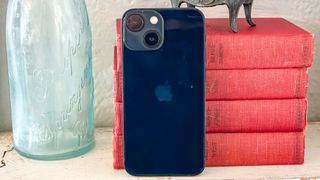

Specifications
Reasons to buy
Reasons to avoid
Apple continued the small phone legacy laid down by the iPhone 12 mini with the iPhone 13 mini. This little handset is very powerful thanks to its A15 Bionic chip. There’s nothing it can’t handle, all while being easily pocketed or used one-handed. The 5.4-inch OLED display is still crisp with excellent colors and viewing angles.
Apple kept the design the same as the iPhone 12 mini, but improved the battery life — in the Tom’s Guide battery test, the iPhone 13 mini lasted over 1.5 hours longer than its predecessor. The cameras also got an upgrade, with the 12MP wide-angle main and 12MP ultrawide cameras benefitting from larger sensors that let in more light. The ultrawide also gained autofocus capabilities. The upgrades don't end there either, as the iPhone 13 mini also received Cinematic Mode and Photographic Styles.
The former lets you record portrait videos with dynamically shifting focus for that artistic look. Photographic Styles are basically real-time filters that you can test out while you’re aiming the camera, letting you capture photos that match your personal taste.
We love the iPhone 13 mini's compact frame and impressive power. It's perfect for people in Australia who want a small phone with powerful hardware and great creative capabilities.
Read our full iPhone 13 mini review.
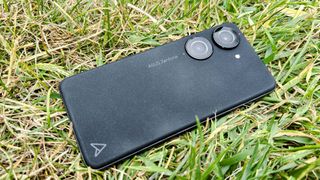
Specifications
Reasons to buy
Reasons to avoid
Small phones may be a rarity in Australia, but Asus isn’t giving up. No siree, the Zenfone 10 is exactly what we wanted to see in a small Android phone. It packs in a ton of horsepower thanks to its Snapdragon 8 Gen 2 processor, paired with up to 16GB of RAM. The 5.9-inch AMOLED display is great with punchy colours, but the battery life doesn't suffer. We really like some of Asus' software alterations to base Android too, such as using the power button as a notification shade switch.
The cameras are generally pretty good for most purposes, though we wish there was a telephoto camera. Also, only two years of full Android updates isn't great for a phone of this price. Nonetheless, the Zenfone 10 is the head of the pack when it comes to small Android phones.
Read our full Asus Zenfone 10 review.
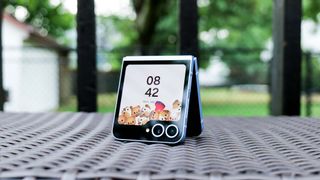
Specifications
Reasons to buy
Reasons to avoid
It's hard to beat a foldable phone when it comes to fitting a whole phone into a small space. And the Galaxy Z Flip 6 is the best option for this right now.
While it has increased in price since last year, the Z Flip 6 justifies the increase by toughening its outer shell with stronger materials upgrading its main camera, increasing the amount of RAM it carries and swapping to the latest Snapdragon 8 Gen 3 chipset. The increased performance pairs nicely with the Galaxy AI features it's gained too.
Other than the higher price, the other weakness of the Galaxy Z Flip 6 is its battery life, which is still on the short side. The Motorola Razr Plus 2024 does better in this regard, but as a whole package, the Galaxy Z Flip 6 remains the best pick for performance in a foldable frame.
Read our full Samsung Galaxy Z Flip 6 review
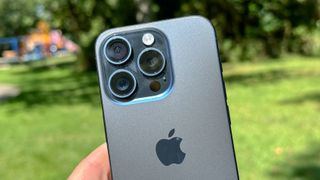
Specifications
Reasons to buy
Reasons to avoid
The iPhone 15 Pro is one of the largest phones on this list despite still being small for a modern flagship. But if you forgive it being a little taller and wider than the other phones on this list, you'll get in return one of the best phones on the market.
Apple's equipped the iPhone 15 Pro with amazing cameras as usual, and a super-powered A17 Pro chip that'll eat up even the most demanding apps. It's also surprisingly light thanks to its titanium body, and features a customizable Action button on its left side for muting the phone, using shortcuts and more.
The only other difficulty with this phone you'll need to accept is that it's quite expensive. You definitely won't be wasting your money if you do decide to splash out on this as your new small phone though.
Read our full iPhone 15 Pro review.
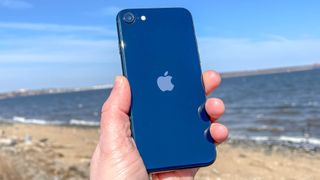

Specifications
Reasons to buy
Reasons to avoid
Apple seems to be the last bastion of small phones, we're sad to say. The recent iPhone 13 mini and now the new iPhone SE (2022) both keep the screen size well under six inches. In the SE’s case, it’s a teeny 4.7-inch LCD. We don't think it's the prettiest, nor does it have a high resolution, but it fits in small hands and pockets.
But, while its looks could now be considered dated, it's entirely up-to-date where things under the hood are concerned. Apple has installed the same A15 Bionic chip that powers the iPhone 13 series, meaning you're highly unlikely to find any phone that is faster for the same AU$719 RRP or less — even the most expensive Android phones have a hard time keeping up in some places.
Of course, there’s no Night mode here, something the equally diminutive iPhone 13 mini has. The new SE also lacks support for Australia's mmWave 5G network. Again, the iPhone 13 mini enjoys that luxury. But when you factor in the low price, you have to understand that some sacrifices need to be made. If having the smallest phone is what you want, the iPhone SE (2022) should be one of your top considerations.
Read our full iPhone SE (2022) review.
How to choose the best small phone for you
You usually have to sacrifice something when buying a small phone. Of course, screen real estate is part of the tradeoff; but small phones also have smaller batteries, and sometimes less RAM or fewer camera lenses than larger, more expensive versions of the same device.
If you prioritise a compact form factor over all else — and you probably do if you're reading this page — these tradeoffs will likely be well worth it. Apple and Google are featured prominently on our list of the best small phones because they don't eliminate critical features from more compact handsets. That's illustrated by the fact that the iPhone 13 mini packs the same punch as the iPhone 13 Pro Max. Or how the iPhone SE (2022) utilises the same A15 Bionic chipset found in those more premium iPhone 13 models.
But the biggest challenge you might face when shopping for the best small phone is just how little choice there is. Smartphone shoppers favour bigger screens and that's where most device makers are putting their efforts these days.
How we test smartphones
In order for a smartphone to make our best phone list, it needs to excel on several tests that we run on every handset. We perform some of these tests in our labs and some in the real world.
When it comes to performance, we rely on such synthetic benchmarks as Geekbench 5 and 3DMark to measure graphics performance. These tests allow us to compare performance across iPhones and Android devices. We also run a real-world video transcoding test on each phone using the Adobe Premiere Rush app and time the result. (We unfortunately have to skip this test on some phones due to app compatibility issues, but we attempt this benchmark with each device we get in to review.)
| Row 0 - Cell 0 | Geekbench 5 (single-core / multicore) | 3DMark Wild Life Unlimited (FPS) |
| iPhone 13 mini | 1733 / 4643 | 61 |
| Zenfone 10 | 1451 / 5027 | 84 |
| Galaxy Z Flip 5 | 1354 / 4288 | 76 |
| iPhone 15 Pro | Not tested | 94 |
| iPhone SE (2022) | 1718 / 4482 | 50 |
To measure the quality of a phone's display, we perform lab tests to determine the brightness of the panel (in nits), as well as how colourful each screen is (DCI-P3 colour gamut). In these cases, higher numbers are better. We also measure colour accuracy of each panel with a Delta-E rating, where lower numbers are better and score of 0 is perfect.
| Row 0 - Cell 0 | sRGB (%) | DCI-P3 (%) | Delta-E |
| iPhone 13 mini | 117 | 83 | 0.27 |
| Zenfone 10 | 148 (Optimal) / 175 (Natural) | 105 (Optimal) / 124 (Natural) | 0.35 (Optimal) / 0.39 (Natural) |
| Galaxy Z Flip 5 | 181.6 (Vivid) / 114 (Natural) | 128 (Vivid) / 80 (Natural) | 0.08 (Vivid) / 0.28 (Natural) |
| iPhone 15 Pro | 117 | 83.5 | 0.14 |
| iPhone SE (2022) | 115 | 81 | 0.21 |
One of the most important tests we run is the Tom's Guide battery test. We run a web surfing test over 5G (or 4G if the phone doesn't have 5G support) at 150 nits of screen brightness until the battery gives out. In general, a phone that lasts 10 hours or more is good, and anything above 11 hours makes our list of the best phone battery life.
| Row 0 - Cell 0 | Battery life (Hrs:Mins) |
| iPhone 13 mini | 8:54 |
| Zenfone 10 | 12:41 (auto), 12:48 (120Hz), 11:21 (90Hz), 13:10 (60Hz) |
| Galaxy Z Flip 5 | 9:42 (Adaptive), 8:52 (60Hz) |
| iPhone 15 Pro | 10:53 |
| iPhone SE (2022) | 7:39 |
Last but not least, we take the best phones out in the field to take photos outdoors, indoors and at night in low light to see how they perform versus their closest competitors. We take shots of landscapes, food, portraits and more, and also allow you to be the judge with side-by-side comparisons in our reviews.
Sign up to get the BEST of Tom's Guide direct to your inbox.
Get instant access to breaking news, the hottest reviews, great deals and helpful tips.

Jordan is the Phones Editor for Tom's Guide, covering all things phone-related. He's written about phones for over six years and plans to continue for a long while to come. He loves nothing more than relaxing in his home with a book, game, or his latest personal writing project. Jordan likes finding new things to dive into, from books and games to new mechanical keyboard switches and fun keycap sets. Outside of work, you can find him poring over open-source software and his studies.
- Max LangridgeSenior Editor, Tom's Guide AU
- Lucy ScottingStaff Writer
-
k0pernikus This article is rather pointless and disappointing due to its "under 6 inches" criteria. In which world are 5 inch smartphones considered small? I'm looking for a phone in the 3.5 to 5 inch range that still packs a punch. I'm not looking to buy something cheap.Reply
Seems to be a true unicorn, it just doesn't exist.
It appears the smartphone market is completely broken for people with small hands and somehow phablets have become the norm.